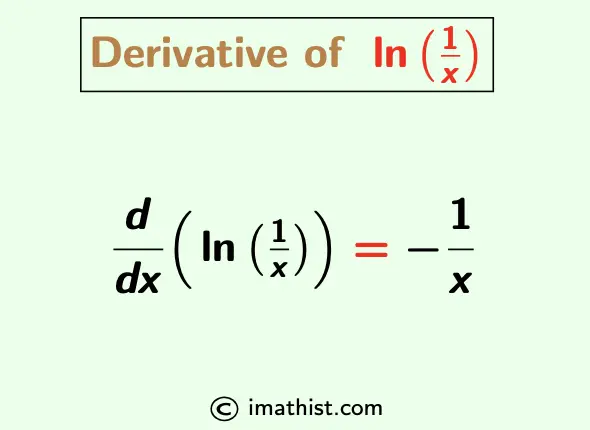The derivative of ln(1/x) is equal to -1/x, where ln denotes the logarithm with base e, that is, ln(x)=logex. In this post, we will find the derivative of ln(1/x).
Note that ln(1/x) is the natural logarithm of 1/x. Its derivative formula is given below:
$\dfrac{d}{dx}\big( \ln (\dfrac{1}{x}) \big)=-\dfrac{1}{x}$.

Derivative of ln(1/x) by Chain Rule
Let z=1/x.
So dz/dx = d/dx(x-1) = -1/x2, by the power rule of derivatives.
Now, we have:
$\dfrac{d}{dx} \big( \ln (\dfrac{1}{x}) \big)$
= $\dfrac{d}{dz} \big( \ln z \big) \times \dfrac{dz}{dx}$ by the chain rule of derivative.
= $\dfrac{1}{z} \times \dfrac{-1}{x^2}$ as the derivative of lnx is 1/x and dz/dx= -1/x2.
= $\dfrac{1}{1/x} \times \dfrac{-1}{x^2}$ as z=1/x.
= $-x \times \dfrac{1}{x^2}$
= $-\dfrac{1}{x}$
So the derivative of ln(1/x) is equal to -1/x, and this is obtained by the chain rule of derivatives.
More Derivative Problems:
Derivative of $\frac{1}{\ln x}$
FAQs
Q1: What is the derivative of ln(1/x)?
Answer: The derivative of ln(1/x) is equal to -1/x.
Q2: If y=ln(1/x), then find dy/dx.
Answer: If y=ln(1/x), then dy/dx= -1/x.